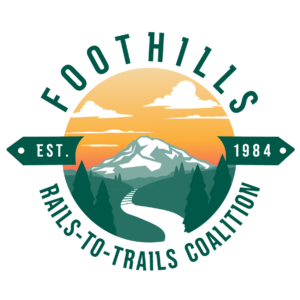By Dan Bucci, President, Foothills Coalition
Hello Members! I hope you have been having a fantastic winter season and are looking forward to the return of spring (I know I am) and more time outdoors and on the trail. As always, we have a lot going on at the FTC, but I’ll leave those updates for other sections in the newsletter this time around. For this edition, I want to use my space to cover some broader recent issues surrounding public lands that impact us all.
As I write this, less than a week ago the Trump Administration announced large cuts to the federal workforce. Among these cuts were thousands, if not tens of thousands of jobs that impact public lands and outdoor recreation. These two things are not only popular but are part of the fabric and identity of our western states including Washington. The National Forest Service alone lost close to 3,500 employees and has already closed trailheads and recreational spaces in Washington citing staffing issues. The National Park Service will certainly struggle with the upcoming visitation season as well as they also are impacted by the cuts. The positions cut include park rangers, maintenance staff, wildland firefighters, and more. These agencies were already spread thin trying to complete the herculean task of keeping public lands safe, maintained, and pristine and these cuts will only make things harder.
Federal funds and grants are also a significant part of funding that goes to the states and local governments to fund local parks and trails, it is yet to be seen how these will be impacted, but given what we have seen done in the last few weeks I’d expect some of these funds could be frozen or cut. The issues are not only at the federal level. Washington State is facing a large budget gap which needs to be dealt with this legislative session. Agencies with ties to public lands such as Washington State Parks are also seeing potential budget cuts. So, what’s the point? Well, we seem to be entering a period where public lands are at risk, which will have negative ramifications not only on existing parks and trails, but the ability to complete projects for new ones.
I don’t need to espouse to you all the benefits of trails, but I think it bears reiterating that trails, such as the Foothills Trails are essential for a happy and healthy population. Parks and trails provide safe, maintained spaces for people to recreate in all different ways. They connect communities, they serve as economic engines and tourism destinations, and as a whole they lead to healthier and happier communities. They also enjoy broad and more importantly bi-partisan public support. I just read a recent poll conducted in eight western states that showed overwhelming support against budget and staffing cuts to the National Parks and National Forests. This support was independent of political beliefs as both red and blue states ranged from 68-80% of those polled being against reductions in support for public lands. Something that enjoys such broad support from the public (as few items do these days) should not be something for which we reduce funding. This seems antithetical to a government that is supposed to reflect the will and desires of its voters.
Closer to home, we can expect to see the impact of these cuts firsthand in one of the true gems of the world right in our backyard, Mount Rainier National Park. The Mountain and its surrounding land has been protected for over 100 years as a National Park. Over the last few years, the park has attracted around 1.8 million visitors each year. That’s close to the equivalent of every citizen of Pierce County visiting the park twice a year. The park is an international travel destination and supports countless local and small businesses in communities all over Pierce County, especially the smaller communities which lie along SR 7, SR 162/165 or SR 410. Any funding or staffing cuts that impact Mount Rainier should be of immediate concern to citizens in Pierce County.
Lastly, you might ask how this impacts the Foothills Trail and why I’ve taken this space to editorialize a bit more than normal? The bottom line is that the Foothills Trail does not exist in a vacuum. Despite it being a county park, the FTC would not exist without federal and state funding and grants. The FTC would not exist if it was not linking communities and destinations. The future of the FTC relies on a healthy, well-staffed and functioning NFS and NPS as they are critical partners in completing a trail through Carbon Canyon, and our vision of a trail that connects Mount Rainier National Park to the Tacoma waterfront. The FTC itself has been the beneficiary of state and federal funds to progress trail studies and projects.
It is important at this time to make sure we are doing all we can to make our voices heard and make sure public lands don’t get left behind in budgetary and political battles. We need to be engaged with our local and state officials, and make sure our federal representatives hear us loud and clear that staffing cuts to public lands are not acceptable. We need to participate in local, state and national elections and support those who share that view. And now, more than ever, we need to continue to offer support to the plethora of trail nonprofits that are fighting the good fight to protect and expand public lands, and equitable outdoor access to ensure we have happy and healthy communities. As I’ve said before, and will say again here, we are truly blessed to live in such a beautiful place as Washington State and have access to so many amazing outdoor spaces. Let’s make our voices heard to ensure that is a reality that exists for generations to come.


